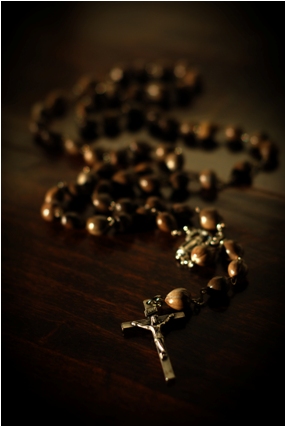
Photography © by Andy Coan
An Anglican Encounters the Catholic Rosary
As a young Anglican curate from an Evangelical background I wasn’t too sure what to do when a friend gave me a rosary. Not wanting to dismiss a form of prayer which was important to millions of Christians around the world, I got a book which explained the rosary and started to pray through the traditional mysteries connected with the life of Christ.
Before long my life began to change. I got involved with a priest who had a counseling ministry. As I worked with him, dark areas of my own life started to be exposed to Christ’s healing light. My life was turned upside down as I faced areas of sin and need that I had hidden from myself. There were times of depression, confusion and fear as God dealt with the deep rebellion and unhappiness which I had locked behind my mask of a successful young minister. The connection with the rosary only dawned when, after a particularly grueling session of counseling my priest friend said gently, “Our Lady’s prayers have helped you so much haven’t they?” Suddenly I realized all the painful re-working God was doing in my life had begun after I started to pray with the rosary.
About a year later, God led me to help others in the healing ministry. The rosary was a tool I put into their hands to help them pray their way into Christ’s healing. Many inner problems are linked with childhood. Even the best parents make mistakes, and children internalize the traumas of childhood. If nothing is done about them the traumas fester and cause emotional or physical problems later. The joyful mysteries are particularly helpful for inner healing because they connect us with the formative stages of life in childhood.
The Healing Power of the Joyful Mysteries
The Annunciation, the Visitation, the Nativity, the Presentation in the Temple and the Finding in the Temple are all about Jesus’ childhood. Jesus went through the stages of natural growth in perfect love. Praying these mysteries with the rosary helps bring Jesus’ healing love into those same stages in our own development.
Some counselors believe the foundations of our personality are laid down at the moment of conception. Studies suggest that people conceived in a moment of lust, drunkenness or violence have a tendency to be lustful, violent people who may develop a drink problem. On the other hand, people conceived in a secure atmosphere of love will have love and confidence at the foundation of their person. Jesus was conceived in a moment of miraculous and perfect love. Praying the rosary and meditating on the Annunciation brings that moment of perfect love into the foundation of our own lives. If we pray with the intention that God will heal any deficiency in the moment of our conception, then Christ’s dynamic love flows into that very moment of our lives, and the inner healing can be profound.
Our Lady’s visitation to Elizabeth took place while Jesus was in her womb. Psychologists and doctors have much reliable evidence that our nine months in the womb are formative not only physically, but emotionally and mentally. If we grow for those nine months in a stress-free environment of love and peace it helps make our personalities full of freedom and loving confidence. If we were carried in a situation where Mother was stressed or angry, those feelings were transmitted and affected our forming personality. As we pray the mystery of the visitation we can ask God to minister to those deep memories within our hearts—memories of our time in the womb. They won’t be specific memories. They may be feelings of frustration, anger, guilt and fear. Those unborn feelings still exist at the base of our person and may influence our daily lives and relationships. Mary carried Jesus in perfect love. As we pray the Visitation the Spirit can minister that healing love to our own memories of those crucial nine months. As God’s love flows into our primitive feelings the effect will be healing and good, even if it remains mostly unconscious.
At the centre of the joyful mysteries is the Nativity. Even though Jesus was born in a stable, he was born into a family of perfect love and joy. Counselors sometimes help their clients through a re-living of the birth experience. Even the best of births is a painful trauma for mother and baby. This is part of the curse of original sin. As we pray the mystery of the Nativity we can ask the Spirit to apply the perfect love and joy of Christ’s birth to our own birth experience. Mary’s motherhood will fill any deficiencies in our natural mother. If there are any traumas and bad emotional effects in our present lives, the healing love of Christ will flow through these prayers and help us to overcome the problems.
The presentation in the temple was a bit like infant baptism. The child is brought to the temple and presented to God for a blessing. Our baptism was the first and most important moment of grace in our lives. As we pray this joyful mystery we can be taken back to the joy of that moment. In meditating on the joy of Mary and Joseph we will be able to share now in the joy that was present at our baptism day, even though at that time we were unconscious. If we were not baptized as an infant something important was missing, and by praying this joyful mystery the Holy Spirit can fill in the blanks, helping apply the joys and fruits of our later baptism back into the memories of childhood. The boy Jesus entered into childhood from that point, and by praying this mystery with an open memory God can minister to any traumas and bad experiences which may have afflicted our childhood. Any present illnesses connected with those bad experiences can then be healed by the perfect love of the child Jesus.
When Mary and Joseph went to find Jesus in the temple he was twelve years old. This is the age of the Jewish boy’s initiation into adulthood. It is about this age that Catholics are confirmed. It is an important milestone in growing up, and it is loaded with risks. The new teenager has to cross the difficult terrain of growing up. This is a time of trauma, doubt, fear and new temptations. If we pray the mystery of finding Christ in the Temple with an open mind—asking God to bring the sins and traumas of adolescence to mind, then any troubles from that time can come into the healing love of Christ. The sins of youth often hang around to plague us later, and if certain past sins come into the memory they can be taken to confession to receive full sacramental forgiveness—even if they are decades old.
Praying the Rosary for Inner Healing
After working through these healing mysteries in my own life, and helping others as a priest and confessor I wrote a whole book on how the rosary can help bring inner healing and reconciliation. Praying the Rosary for Inner Healing has already touched thousands of lives. I have been asked to lead conferences and retreats based on this method of healing prayer, and have seen many people touched and transformed by God’s grace in this powerful, but gentle way. I encourage you to pick up that rosary again and use it! Many saints and doctors of the church recommend the rosary as the way to do spiritual battle. Why not seek God’s healing and peace and enter the first and most fundamental conflict of all—the battleground of your own heart and mind?
Fr Dwight Longenecker is the parish priest of Our Lady of the Rosary Church in Greenville, South Carolina. He is author of thirteen books on the Catholic faith. Praying the Rosary for Inner Healing is available in Catholic bookshops and through his website: dwightlongenecker.com
Follow Fr. Longenecker on Facebook: http://www.facebook.com/frlongenecker
Please help us in our mission to assist readers to integrate their Catholic faith, family and work. Tell your family and friends about this article using both the Share and Recommend buttons below and via email. We value your comments and encourage you to leave your thoughts below. Thank you! – The Editors













